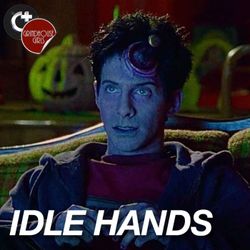Share

The Cinedicate: Film & TV Podcast
#135 - The Muppet Christmas Carol - Bringing Humor and Music to a Timeless Classic
For many of us, The Muppets hold a special place in our hearts. From The Muppet Show to the classic films, they have brought joy and laughter to countless households. Heather, one of the hosts of WSTR, shares her own experience growing up with The Muppets. Being the youngest in her family, Heather was exposed to movies that were perhaps a little too mature for her age. But that didn't stop her from falling in love with The Muppets.
The Muppets Christmas Carol has always stood out in the sea of Christmas Carol adaptations. As Heather explains, many versions struggled with the limitations of technology and budget, finding it challenging to bring the story's supernatural elements to life. However, The Muppets' Christmas Carol defied expectations. Not only did it capture the essence of the classic Christmas tale, but it also pushed the boundaries with its high production value. The visuals and special effects were impressive, creating an atmosphere that wasn't just merry and bright, but also a little spooky. And let's not forget about the performances. Michael Caine, who played the leading role, approached the film with utmost seriousness, despite the presence of singing and dancing Muppets. This balance between silliness and seriousness is what makes The Muppets Christmas Carol a timeless classic that continues to resonate with audiences of all ages.
----------
Listen to Heather on her podcast, WSTR: Galactic Public Access
----------
More episodes
View all episodes

SWAPCAST - Idle Hands - 90s Vibes, Killer Soundtracks, and Stoner Comedy
01:36:03||Season 5On this Swapcast episode with The Grindhouse Girls, we’re embracing the spirit of Spooptober as we dig into the late-90s cult classic, Idle Hands.Together with Katie and Brit, we unpack how Idle Hands stumbled out of the gate—released just days after the Columbine tragedy—yet found a second life as a beloved staple for fans of Halloween nostalgia and dark comedy.So, whether you’re here for the wild practical effects, the unforgettable soundtrack, or just love a good goofy group watch, join us as we dissect, reminisce, and poke fun at this gloriously weird gem from the VHS era.What to expect from the episode:A nostalgic group discussion unpacking Idle Hands as a cult 90s horror-comedy, including the film’s troubled release after Columbine and its transformation into a sleeper hitPlayful banter and personal stories from the hosts about teen movie crushes, coming-of-age in the 90s/early 2000s, and the enduring appeal (and cheesiness) of slacker-stoner horrorCandid takes on the film’s practical effects, genre parodies, controversial moments, and the challenges (and pitfalls) of remaking cult classics for new generationsEpisode Chapters:00:00:00 - Spooptober Kickoff, Idle Hands, Columbine & Cult Classic Status00:03:39 - The Cast and 90s/2000s Nostalgia00:09:42 - Columbine, Gun Violence, & American Youth Culture00:18:58 - High School Literature, Canterbury Tales & Coming-of-age Memories00:23:28 - Gun Trauma & Idle Hands Reception00:27:36 - Horror Parody, References & Soundtrack Nostalgia00:43:00 - Hollywood Remakes, Generational Nostalgia & Finn Wolfhard’s Remake00:53:20 - Teen Portrayals and Beauty Standards00:59:28 - Letterboxd, Film Critique Culture & Community Reactions01:10:01 - Ratings, Creative Wrap-Up, Upcoming Episodes & Sign-Off----------Listen to Brit and Katie on their podcast, The Grindhouse Girls.
92. #192 - For Liberty! A Helldivers Film - Fan Passion Versus Studio Adaptations
01:04:21||Season 5, Ep. 92Welcome back to The Cinedicate. On today’s episode, Armand and Alex suit up and dive into the fan-made Helldivers film, "For Liberty!" We explore how this ambitious passion project captures the satirical spirit of the video game franchise, as well as the complexities of war and loyalty.Together, we discuss why fan creations can sometimes outshine official adaptations, dig into the nuanced storytelling that only true players will catch, and unpack the layered parallels to real-world history and politics. Whether you’re a Helldivers veteran, a newcomer to the universe, or just interested in how games and movies can reflect the world around us, join us as we dissect what makes "For Liberty!" the definitive Helldivers experience—right here on The Cinedicate.What to expect from the episode:A deep-dive into the fan-made Helldivers short film "For Liberty," including its production, themes, and connection to the video game’s satirical universeInsightful discussion on the power of passion projects versus studio adaptations, highlighting the risks of handing over beloved franchises to creators unfamiliar with source materialProvocative parallels drawn between Helldivers’ narrative and real-world political satire, exploring how media and video games critique democracy, propaganda, and the realities behind "freedom"Episode Chapters00:00:00 - Introduction and Helldivers Satire00:01:10 - Fan-Made Film Release and the Power of Passion Projects00:04:50 - Why Fan Works Outshine Official Adaptations00:06:03 - Studio Adaptation Pitfalls00:07:08 - Details Only Real Fans Get Right00:10:41 - Explaining Helldivers Lore and Satirical World-Building00:13:51 - "For Liberty" Film Story Beats00:19:09 - Satire, Martyrdom, and Propaganda00:22:50 - Comparing Satire: Helldivers, Starship Troopers, and Real Life00:29:57 - The Lesser Evil: Choosing Sides Among Factions00:39:11 - Satire’s Role in Storytelling—Games and Film00:55:24 - Future of Helldivers Stories—Sequels, Adaptations, and Lore
91. #191 - Star Wars: Holiday Special (1978) - Why We Deserve a Good Christmas Special
56:42||Season 5, Ep. 91Christmas Special, Part IIWelcome back to The Cinedicate. On today’s episode, we’re unwrapping one of the most notorious pieces of Star Wars history: the infamous Star Wars Holiday Special.Joining me are Alex and Al as we relive the highs, the lows, and the truly bizarre moments that make this relic so unforgettable. From Wookiee family drama and musical cameos to the debut of Boba Fett, we discuss what worked, what didn’t, and why this oddball variety show still haunts the galaxy far, far away.Whether you’re a die-hard fan or just wondering how Chewbacca’s grandpa ended up watching adult films in the living room, this episode explores what the Holiday Special says about the franchise—and how it could be revived today.So grab your Life Day orbs and get ready to spend less time scrolling and more time watching, as we celebrate the weirdest day in the Star Wars universe, here on The Cinedicate.What to expect from the episode:A hilarious and brutally honest breakdown of the infamous Star Wars Holiday Special—including its most bizarre moments, failed segments, and the lone standout Boba Fett cartoonCreative pitches and lively discussion on how a modern Star Wars holiday special could be improved, featuring dream casting for musical numbers, celebrity cameos, and debates over live-action versus animation formatsInsightful reflection on Star Wars’ place in pop culture today: Is a new holiday special even viable? And why does Disney keep missing opportunities for festive Star Wars content despite decades of fan demand?Episode Chapters00:00:00 - Introduction00:01:40 - First Impressions of the Star Wars Holiday Special00:02:34 - Comparing the Holiday Special to Modern Star Wars & Andor00:03:15 - Bizarre & Notable Moments00:05:41 - How to Fix the Holiday Special00:09:45 - Structuring & Formatting a Modern Holiday Special00:11:59 - Reframing the Special: Interdimensional Cable, Life Day Parade & Canonical In-Universe TV00:13:10 - Animation vs. Live Action for a New Special00:17:06 - Comparing Star Wars Parodies: Family Guy and Robot Chicken00:22:33 - Star Wars’ Cultural Relevance, Timing, and Modern Fandom00:27:13 - Speculating Frameworks & When a Special Would Be Most Impactful00:31:12 - The Absence of a Proper Holiday Special in the Disney Era00:32:41 - George Lucas, the Holiday Special’s Legacy & Canon00:35:04 - So Bad It's Good?00:37:12 - Studio Control and Creative Freedom00:40:32 - Will There Ever Be a New Special?00:44:57 - Looking to Other Franchises' Holiday Practices00:48:11 - Disney’s Reluctance & Possibilities for Life Day00:50:11 - Other Christmas Specials, Longing for Star Wars Holiday Traditions & Thematic Possibilities00:54:40 - Final Thoughts, Parting Words & Episode Sign-Off
90. #190 - Silent Night, Deadly Night (2025) - Indie Horror, Dexter Vibes, and Christmas Mayhem
01:52:47||Season 5, Ep. 902025 Christmas Special Part, IWelcome back! On today’s episode, we’re slicing into the snow with a look at one of holiday horror’s weirdest cult franchises—Silent Night, Deadly Night.I’m joined by the Grindhouse Girls and longtime Cinedicate guest Ali, as we all break down the latest reboot of the original film.So whether you’re a diehard slasher fan, seeking yuletide carnage, or just wondering how Santa wound up fighting Nazis on Christmas Eve—pull up a seat. Join us as we unwrap all the chilling, bloody, surprisingly heartfelt moments of Silent Night, Deadly Night, right here on The Cinedicate.What to expect from the episode:Spirited discussion on the legacy, themes, and unexpected twists of the "Silent Night, Deadly Night" remake, including its approach to holiday horror and the integration of social issues like Nazis and vigilantism.Comparative deep-dive into the remake versus the original franchise’s notorious exploitation elements, including changes in violence, characterization, and the avoidance of gratuitous content.Anecdotal exploration of viewing experiences, horror movie traditions, and recommendations for both horror aficionados and newcomers seeking alternative holiday films.Episode Chapters00:00:00 - Introductions, Franchise History & "Garbage Day"00:04:24 - Our theater Experiences00:07:40 - Indie Horror, Gore Effects, Mean-Spiritedness & Changes in Slashers00:09:19 - Billy as Anti-Hero00:11:19 - Casting Trivia, Actor Lineages, Genre Lore & Pop-Culture Tangents00:13:05 - Why this film is relevant today.00:18:16 - Wolfenstein, Inglourious Basterds, and Meta References00:29:17 - Sequel Setup00:36:08 - Victim Justification, Kill Montage & Thematic Shifts00:41:40 - Romance Influences, Acceptance, Audience Expectations & Film Longevity00:52:10 - Oscar/Nominations and Netflix Buying WB, Fandom Tangents00:57:30 - Remake Comparisons: Criteria, Good/Bad Examples, Holiday Horror Lists01:00:56 - Personal Traditions, Hallmark Movies, Dickens Ghost Stories, Film Choices01:19:19 - Franchise Fatigue, Problematic Actors & Cancel Culture01:23:04 - Podcast Mishaps, Recommendations, Horror Fandom & Cosplay01:36:07 - Body Horror, Practical Effects, Gore01:37:35 - Biopic Potential, Playing Villains, Video Game Nazi-Killing (Wolfenstein)01:42:18 - Reflections, Plugs, Creative Projects, Farewells & Holiday Wishes
89. #189 - Suburban Sasquatch Commentary Track
01:47:20||Season 5, Ep. 89Welcome back to The Cinedicate. On today’s episode, we’re taking a wild trip through the world of ultra-low-budget cinema with a commentary experience on the infamous cult classic, Suburban Sasquatch.Joining me are Katie and Brit from the Grindhouse Girls podcast, as we brave this $500 masterpiece. From questionable costumes and DIY special effects to baffling storylines and even a surprising debate about Bigfoot’s true nature, we’ll laugh, cringe, and (barely) survive the chaos together.So whether you love digging deep into the best bad movies or just can’t resist a cryptid rampaging through suburbia, grab your popcorn and prepare to witness “cinematic history” as we break down everything you didn’t ask for about Suburban Sasquatch, here on The Cinedicate.Start the commentary track as soon as you hit play on the movie.What to expect from the episode:A hilarious, unsparing group commentary on Suburban Sasquatch, exploring its low-budget production, questionable costume choices, and unintentionally comedic momentsCandid discussions about cultural representation, filmmaking competence, and the blurred lines between passion projects and vanity in indie cinemaLighthearted banter among the hosts about cryptids, genre tropes, and their own tolerance (or lack thereof) for “so-bad-it’s-good” movies, with frequent pop culture references and personal anecdotes----------Listen to Brit and Katie on their podcast, The Grindhouse Girls.
88. #188 - Alien: Earth - Franchise Retreads, Corporate Greed, and AI Nightmare Fuel
01:30:57||Season 5, Ep. 88Welcome back to The Cinedicate. On today's episode, we're crash-landing into Alien: Earth, the first-ever Alien TV series. We break down the hybrid identity of Wendy, the corporate wars brewing between Weyland Yutani and Prodigy, and ask the big questions: What will humanity become when evolution and technology collide? Was Alien Earth a worthy addition to the Alien legacy, or just another xenomorph cash grab?So whether you're a lifelong Alien fan, love a good sci-fi debate, or just wonder what happens when memory itself becomes a weapon, join us as we dig through the wreckage and chart the future of the franchise—right here on The Cinedicate.What to expect from the episode:First impressions, debates, and generational perspectives on the new Alien: Earth TV series, including discussion on its connections to the classic films, franchise fatigue, and whether it brings anything new to the Alien universe.Deep dive into the show’s major themes: AI consciousness, biotech, corporate power, and the ethics of uploading human minds into synthetic bodies, with comparisons to real-world technology and other sci-fi stories like Blade Runner and Altered Carbon.Spirited discussion on the show’s structure, pacing, and narrative choices, including debates over fan service vs. originality, unresolved storylines, the impact of streaming models, and recommendations about whether Alien: Earth is a must-watch for Alien fans (or if you should just go watch Romulus or Blade Runner instead).Episode Chapters 00:00:00 - Introduction to Alien: Earth & Central Themes 00:01:47 - Personal Entry Points to Alien Franchise 00:08:29 - First Impressions - Alien: Earth00:11:31 - Series' Retro Aesthetic00:13:48 - Narrative Structure and Release Strategy 00:17:52 - Alien: Earth vs. Alien Romulus / Retreading Franchise Territory 00:20:40 - Hybrid Identity, Biotech, and AI in Alien: Earth00:30:33 - AI Sentience, Deception, and Control—Parallels to Reality 00:36:59 - Xenomorphs’ Role: Gore, Threat, and Audience Expectations 00:39:50 - Timeline and Canon Questions00:43:17 - Other Alien Species: Significance, Motivation, and Unanswered Mysteries 00:46:35 - Desire for Narrative Closure: Open-Ended Finale Critique 00:49:13 - Themes of Power Transfer 00:50:43 - AVP/Potential Crossovers & Franchise-Building Speculation 00:55:53 - The Formula and Essence of an Alien Movie 01:02:42 - Ethical Debate: Should Humanity Weaponize Alien Life or Technology? 01:14:18 - Government vs. Corporation: Who Should Contain Biohazards? 01:17:43 - Alien: Earth in the Context of other Alien Media 01:27:20 - Final Judgment 01:29:49 - Outro
87. #187 - Clue - Murder, Misdirection, and Madcap Comedy
01:00:01||Season 5, Ep. 87Ready for a killer good time? Join Armand and Alex as they unravel the zany, rapid-fire murder mystery of Clue—from cult classic status to its razor-sharp comedy, legendary cast, and the infamous multiple endings. Whether you’re a longtime board game buff or just discovering the film’s madcap magic, this episode dives deep into how Clue turned whodunnit logic into pure cinematic chaos, why Tim Curry steals the show, and whether the movie is the ultimate Halloween pick. Plus: off-the-rails tangents, pop culture connections, and what makes this gleeful satire truly timeless. Stop scrolling and get clued in!What to expect from the episode:A lively exploration of why Clue (1985) is a cult classic, from its rapid-fire comedic delivery and ensemble cast performances to its clever satirical take on the whodunnit genre.Behind-the-scenes insights into the film’s production history, alternate endings, casting choices (including the indispensable Tim Curry), and its surprising parallels to contemporary mysteries like Knives Out.A spirited discussion on the film’s legacy, why it remains atmospherically perfect for Halloween, and debate around whether a modern remake could ever recapture its unique charm.Episode Chapters00:00:00 - Introduction00:01:16 - Personal Connection & Pop Culture Impact00:03:32 - Comedic Tone & Performances00:06:41 - Plot Summary00:11:11 - Casting Choices00:12:18 - Ending Analysis & Spoiler Discussion00:15:48 - Satire Reception & Background Humor00:19:36 - Character Motives & Moral Ambiguity00:27:30 - Plot Twists & Parallels to Knives Out00:29:42 - Cult Status & Direction00:33:36 - Adaptations, Remakes & Modern Cinema00:35:10 - Ensemble Cast vs. Modern Filmmaking00:37:59 - Franchise Planning & Characterization00:42:34 - Director’s Intent & Style Speculation00:44:44 - Remake Feasibility & Contemporary Comedy00:53:11 - Tim Curry's Importance00:56:41 - Clue as a Halloween Movie00:58:48 - Closing
SWAPCAST - Phantom of the Paradise - Fame, Flamboyancy, & Faustian Bargains
01:56:25||Season 5Dive into the twisted rock 'n' roll nightmare of Brian De Palma's Phantom of the Paradise this Spooptober, where fame devours the soul and every contract's signed in blood. The Grindhouse Girls, Katie and Brit, are joined by the host of The Cinedicate, Armand Haddad, for a wild ride through Faustian bargains, flamboyant beefcakes, and cult classic chaos. Tune in for laughs, lore, and a healthy dose of '70s horror glam—because nothing says Halloween like a phantom who just wants his music back.What to expect from the episode:Hosts unpack Brian De Palma's elevator epiphany that birthed Phantom of the Paradise, blending Beatles rage with Faustian pacts, Edgar Allan Poe nods, and '70s satire.Deep dives into standout characters like Jessica Harper's ethereal Phoenix and the effervescent Beef (a Little Richard-inspired beefcake channeling Dennis Reynolds vibes).Explorations of the film's enduring ripples on Daft Punk, manga aesthetics, Rocky Horror echoes, and its box-office bomb status turning into underground legend.Episode Chapters:00:00 - Spooptober Intro00:54 - Elevator Rage to Rock Opera: De Palma's Wild Inspiration03:07 - From Secondhand DVDs to Daft Punk Dreams: How We Found This Gem05:35 - Box Office Bomb to Cult Icon06:33 - Chaos Behind the Mask08:09 - Faust, Frankenstein, and Gothic Roots10:36 - Rocky Horror Riffs13:18 - De Palma's Fury19:01 - Beef's Glittery Grind22:43 - Pop Culture Nods38:33 - Ratings, Raves, and Grindhouse Grades41:31 - Plugs, Previews, and Next Haunts48:12 - Stephen King Gripes, Adaptations, and Derry Dreams54:35 - Outro and Stay Spoopy----------Listen to Brit and Katie on their podcast, The Grindhouse Girls.----------The Cinedicate on InstagramThe Cinedicate's Discord Community
86. #186 - Weapons - Using Horror to Explore Grief and Community Decay
01:20:16||Season 5, Ep. 86Seventeen children vanish without a trace, a small town turns on itself, and a mysterious force called Gladys starts to haunt the shadows—this week on The Cinedicate, Armand, Pete, and Fresh unravel the chilling layers of Zach Cregger's horror film Weapons.From Pied Piper legends and haunting dream sequences to coded tributes and razor-sharp social commentary, the trio digs into the film’s eerie atmosphere, unforgettable performances, and the real-world grief that inspired it. Is the true monster the witch, or the trauma we carry?What to expect from the episode:An in-depth exploration of Zach Cregger’s Weapons, focusing on its blend of supernatural horror, allegory, and commentary on grief, loss, and community decaySpirited discussion about the film’s narrative structure, multidimensional characters, and the symbolism behind key elements (such as the number 2:17, Gladys as a modern witch, and the importance of subtle political themes)Honest reactions to the movie’s originality, debate over the need for sequels, and reflections on the future of cinema and attention spans in the age of streaming and rapid media consumptionEpisode Chapters00:00:00 - Introduction and Weapons Overview00:02:03 - Why Weapons00:04:08 - First Impressions, Marketing, and Expectations00:07:06 - Zach Cregger's Background and Comedy Roots00:09:06 - Cast, Genre, and Film Comparisons00:11:05 - Plot Summary and Nonlinear Structure00:13:41 - Viewing Experience, Audience, and Theatrical Release00:15:28 - Tonal Expectations, Symbolism, and Personal Theories00:21:47 - Symbolism of 2:1700:23:01 - Institutions, Community Breakdown, and Parental Roles00:32:22 - Grief and Character Archetypes00:36:11 - Gladys’s Nature: Witchcraft, Evil, and Trauma00:48:56 - James the Tweaker: Comic Relief and Truth Teller00:51:19 - Climax, Breaking the Cycle, and Lingering Grief00:56:43 - Comparative Filmmaking and Industry Context00:58:43 - Subtlety vs. Overt Politics in Horror01:03:25 - Franchise Potential & Creative Restraint01:11:20 - The Future of Cinema: Audiences, Streaming, and Generations01:19:18 - Closing Thoughts and Appreciation01:20:09 - Outro